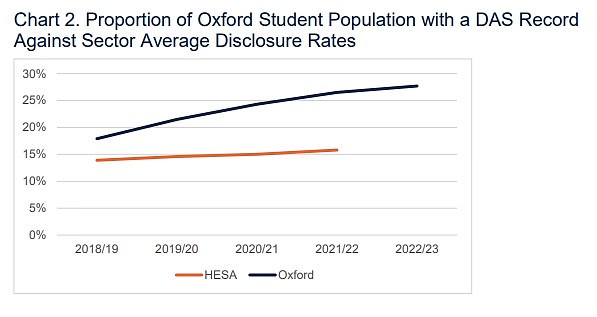Almost every University of Oxford student screened for ADHD was marked as having it after a 90-minute-assessment by an unqualified expert – meaning they could have extra time in exams.
Statistics show the UK’s top university has an increasingly higher number of disabled people than the rest of the higher education sector – amounting to nearly 1 in 3, according to the most recent disability service report from 2022/2023.
Students who thought they might have ADHD requested a test from the university and were sent back a form, with questions like ‘Would you describe yourself as a well-organised person?’ and ‘Do you tend to be on time to appointments?’.
After filling it out they were then referred to an in-house university-funded assessment centre to meet with someone for 90 minutes who decided whether they had it. Oxford admits this is not a medical diagnosis.
But 98 per cent of people who emerged from the assessment were told they had a disorder and became eligible for at least 25 per cent extra time in exams.
The number of individuals informed they had an SpLD (Specific Learning Difficulty) – a term that includes ADHD and other conditions – the previous year was 97 per cent and it was 99 per cent the year before that.
Oxford’s SpLD screening system – which was recently replaced – is difficult to compare to public processes, which are not detailed as thoroughly.
Some NHS Trusts do release figures that suggest the university’s system approves far more people as having the condition than them.

Statistics indicate the UK’s top university has an increasingly larger number of disabled people compared to the rest of the higher education sector
At the Sheffield Health and Social Care NHS Foundation Trust just 3 per cent of people passed an initial round of screening in 2022/2023 – the highest adult screening out percentage in the country.
On average, where screening is used for adults 32 per cent will be screened out in the early stages.
Screening is the process of gathering information through interviews and questionnaires to eliminate individuals formally referred to practices from their NHS list.
A 26-year-old woman diagnosed with severe combination ADHD after an assessment by doctors and a psychiatrist lasting three months said she was shocked by the short length of the Oxford University process.
The patient told MailOnline: ‘A self-diagnosis or a short assessment done in-house at a university does not seem to me like a proper or legitimate way of telling anyone they have ADHD.
‘It is seen as a quirky trend by a lot of people now and they think it’s cool to have it. It is absolutely not. I am a different person now I take medication and know how to manage my symptoms. My life improved after diagnosis but I still struggle with my ADHD every day. It is not something I would wish even on my worst enemy so it can be difficult to see people glamourise it or self-diagnose as I worry it will make people take me less seriously.
‘It’s not difficult to figure out how to answer the questionnaire in a way that would make it seem like you had it to the person looking at it but people simply do not realise how badly you need to experience those symptoms to be able to tick the box.

The examination school at Oxford University, where some students are permitted to sit their exams with extra time
‘It is damaging to diagnose people so flippantly as it makes things harder for those who truly do have it. It is shocking that such a reputable university is doing this.’
In 2022/2023, the amount of students with an Oxford DAS record – which means they are registered disabled with the university – stood at around 28 per cent while the average for the higher education sector as a whole was roughly 17 per cent.
This compares to an average of 17.7 per cent for the general England population, according to the 2021 census.
Standard examination adjustments for students with ADHD and other SpLDs are 25 per cent additional time and use of a computer, though arrangements may be reviewed if there is ‘evidence that further consideration is required’.
Further figures show that between 2017/18 and 2022/23, the number of students with a listed mental health condition at the university jumped from 1161 to 1960.
The report states there has been a ‘substantial rise in students seeking an educational assessment due to concerns about attentional deficits’.
It adds more than 31 per cent of the assessments funded by the DAS confirmed an SpLD profile of ADHD or similar attentional deficits – the remainder being for other neurological disorders like autism and dyslexia.


Statistics indicate the UK’s top university has an increasingly larger number of disabled people than the rest of the higher education sector
The revelation comes amid Health Secretary Wes Streeting‘s warning at the weekend of a rise in ‘overdiagnosis’ in the general population.
He told the BBC: ‘I want to follow the evidence and I agree with that point about overdiagnosis.
‘Here’s the other thing, mental wellbeing, illness, it’s a spectrum and I think definitely there’s an overdiagnosis.
‘But there’s too many people being written off and, to your point about treatment, too many people who just aren’t getting the support they need.’
The Oxford annual report says female students are over-represented in DAS records at 57 per cent, compared to 43 per cent male.
It also states ‘white students are slightly over-represented amongst DAS users (67 per cent) compared with the wider student population (59 per cent)’.
However, Chinese students ‘remain relatively under-represented amongst DAS users (4.6 per cent DAS registrations compared to 11.5 per cent of whole student population)’.
A form seen by MailOnline from 2021 – the first correspondence sent to students after they request a test for ADHD – asks them to ‘describe their disability’.

The University of Oxford did not dispute the tone of presumption in the form, when approached, but stated the DAS ‘does not accept self-diagnosis as evidence to register with the service’.
A spokesman said: ‘Oxford is committed to ensuring that all of our students have access to an outstanding educational experience at Oxford and that we fulfil our legal obligations by providing reasonable individual adjustments and study support for disabled students.
‘We are pleased to offer an environment in which disabled students want to study and can disclose a disability, and the University remains firmly committed to reducing and removing barriers to learning and embedding inclusive teaching and learning practices that benefit all students.’
The University added assessment centres closed in 2024 due to changes in government procurement and that since then there had been an ‘incremental move to a new service model’.
But students were also assured in the 2022/2023 DAS report that ‘DAS will review and evaluate the impact of the changes to disability evidence to enable more students access to some commonly recommended adjustments’.
The University refused to respond when asked what percentage of students were referred to an education assessment centre after filling out the background questionnaire form in 2022/2023.
It also gave no answer as to who carried out the clinical assessments in the year 2022/2023, what their qualifications were and how they were connected to the University.







